- Home
- Todd Strasser
Summer of '69 Page 21
Summer of '69 Read online
Page 21
“We’ll go underground.”
It’s 4:30 a.m. and Milton stinks of gasoline. Sirens wail in the distance. A few minutes ago, I was awakened by a plink, plink, plink against my bedroom window. It sounded like small hail. In the middle of summer. I dragged myself out of bed and pulled back the shade. Milton’s face was pressed close to the glass, which he was tapping with a fingernail.
There’s nothing like the odor of gasoline to clear out the cobwebs. Milton is pacing around my room. I can count on one hand the number of times I’ve seen him this wound up. (Most have been this summer.) But what he’s just told me is mind-boggling: ten minutes ago he threw a Molotov cocktail at the home of New York State Supreme Court justice Leopold R. Wagner.
If it weren’t for the sirens, I’d think either I heard him incorrectly or he and I have a different understanding of what a Molotov cocktail is. To me, it’s a bottle filled with gasoline and a rag sticking out of the neck. You light the rag and throw the bottle at the target. The bottle breaks and the gasoline ignites in a violent explosion. The target goes up in flames.
The sirens appear to confirm that that is what Milton thinks a Molotov cocktail is, too. A few days ago, the gun, and now this? Has his mind been taken over by malignant spirits? The SDS? Che Guevara?
“Did anyone get hurt?” I ask.
He shakes his head. “It hit the front walk.” He lifts his sleeve close to his face, sniffs, and wrinkles his nose.
It’s understandable if I can’t quite believe this, right? If Milton gets caught, he’s not getting up in the morning and going back to learning COBOL. He’s probably not going back to MIT in the fall.
If I go to prison, we could be cell mates.
“Why?” I ask.
“Yesterday that douchebag put five draft-card burners in prison because they burned pieces of paper.”
I raise my hands, gesturing for him to lower his voice.
“They got two and a half years in jail for what?” Milton goes on. “Disagreeing with a government that’s responsible for the deaths of nearly a thousand American soldiers every month? And nearly four thousand Vietnamese soldiers and civilians? It’s a violation of their human rights. It’s a violation of their freedom of speech. They burned pieces of paper, Lucas.”
It’s coming back to me. “That’s the judge your father plays chess with?”
“Probably not anymore,” Milton says ruefully. He resumes pacing, then absently picks up the album cover of Fresh Cream, looks at it, puts it back down.
“Why go underground?” I ask.
“Someone saw me.” Milton explains that the first two times he threw the Molotov cocktail, it landed on the Wagners’ lawn and went out. Twice he had to retrieve it, relight it, and try again. “Damn thing wouldn’t break. I won’t use a Welch’s jelly jar next time — that’s for sure.”
“Next time, Milton?”
He lifts his hands and drops them in a gesture of frustration.
“Who saw you?” I ask.
“Guy who lives next door. The jar finally blows up and the next thing I know, someone’s calling my name. ‘Milton? Milton Fischer, is that you?’ I look over and there’s this guy in pajamas standing on his front lawn.”
Can you picture it? Joe Schmo gets up for a four a.m. snack. He’s poking around in the refrigerator when he hears something outside. Looks out the window, and there’s this kid from the neighborhood throwing a Molotov cocktail at the house next door.
Milton slumps into the desk chair, wringing his hands. “My grandparents were forced to flee Austria. Rudy had to leave this country. I’m not running. It’s time to stay and fight, Lucas. A true patriot must defend his country against his government.”
Sounds like revolution is in the air. Only . . . “What does going underground even mean?”
“You go to a cemetery and find someone who died before they were ten years old — someone who wouldn’t have been old enough to work so they wouldn’t have needed a Social Security card. You use their name to apply for one. Once you’ve got that, you get another ID, like a library card or something. You use those IDs to get a driver’s license. Presto, you have a new identity.”
Weird — it sounds like what my father’s doing with me. Only he’s using my name. “And then?”
Milton’s eyes slide away. His forehead bunches. He props his elbows on his knees and leans forward. “There have to be others. Draft resisters. Antiwar advocates. The SDS. We join them and fight to end this stupid war.”
In another part of the house, a phone rings. It’s 4:40 a.m. Not hard to guess who’s calling.
“It’s your parents, man.”
Milton straightens up. His eyes dart left and right, and he presses his hands down on the arms of the chair like he’s about to spring up and make a break for it.
“Milton, they’ve already lost Rudy.”
He slumps back into the chair and bites his lip. His parents would be devastated. “Then we’ll go to Canada. Join Rudy. My parents’ll know we’re together.”
He may be a genius, but right now he’s not thinking straight. “That’s the first place the cops would look for you. With Rudy. Canada may not allow the extradition of draft dodgers, but I have a feeling it’s not the same for arsonists.”
Milton makes a fist and bangs it against the desktop. “Shit. Shit!”
There’s a soft tap on my door.
“Come in, Mom.”
The door opens. Mom’s wrapped in a blue robe, blinking the sleep out of her eyes. Her hair is flat on one side. She sniffs. “Gasoline?”
“Milton’s parents want him home?” I think it best to move the conversation along.
She nods. “What’s going on?”
“Nothing, Mom.”
“Oh, of course,” Mom says with a drollness I’ve forgotten she was capable of. “It’s the middle of the night and your friend is here reeking of gasoline. What could possibly make me think something was going on?”
In the predawn darkness, the air is heavy with moisture. Houses are shadowy silhouettes. I’ve pulled on pants and a shirt to escort Milton home. A week ago, if someone had asked me if he would ever carry a gun or throw a Molotov cocktail at a house, I would have said never, not in a million years.
“Listen, man,” I tell him. “What happened to Rudy is beyond shitty. You have every right to be pissed, but right now you have to fix what happened tonight. Then go back to MIT and keep doing whatever you’re doing. You’ve got more promise than Arno and me combined and multiplied. So don’t blow it, okay? There are plenty of other people around to protest the war and all the other crap that’s wrong with this country. But they don’t have one-tenth your brains. Let them be the ones who go underground while you go on to a lifetime of accomplishment.”
Milton’s quiet for a moment. Then says, “You didn’t just make that up.”
“I might’ve started thinking about it back in my room,” I admit. “How’d you know?”
“‘A lifetime of accomplishment?’ Get real.”
“I was trying to make a point,” I say defensively.
“I know. And it shows talent. Ever consider going into speechwriting?”
“Seriously, Milton.”
“Okay, okay. I heard you.”
Somewhere in the dark, a bird begins to chirp. It’s getting close to dawn. The lights are on in Milton’s house. The front door opens before we reach it. Mrs. Fischer’s eyes are glistening. Mr. Fischer looks grim. They put their arms around their son and lead him inside. They don’t ask what happened.
They already know.
Mom’s sitting at the kitchen table with a cup of coffee. Once she’s up, she’s up. “Tell me.”
When I do, she looks stricken. “Oh, dear God. His poor parents.” She shudders. “All of you, with the bodies of men and the brains of infants.”
Guess that about sums it up. She sips her coffee. We sit in silence. She hasn’t asked about my draft situation lately, but she must be wondering. I tell her I’ve air
mailed a letter to the Berkeley chapter of the Mobe. Inside is another letter addressed to the Great Neck draft board requesting permission to take my induction physical in San Francisco. Someone at the Mobe will post the letter so that it will look like I mailed it from California. As soon as they receive a reply from the Great Neck board, the Mobe will let me know and I’ll fly out there for the physical.
“It’s going to be expensive,” I warn her. “Think Dad’ll spring for it?”
I’m mostly joking, but Mom takes it seriously. “Of course he will. He loves you.”
Ire spikes inside me. “Why —?” I start too loudly and catch myself. “Why do you always defend him, Mom?”
The kitchen grows still. In the first faint hint of dawn, the backyard has turned gray. Mom starts to lift her cup, then sets it down. She reaches for my hand and again studies my bitten fingernails. “Lucas, don’t let”— she pauses, as if choosing her words carefully — “whatever happens between him and me affect your relationship.”
“What relationship?”
She lets go of my hand. The crows’-feet around her eyes deepen. “You know, young man, you haven’t exactly been the easiest son.”
“And he’s been an easy father?”
Her gaze goes down to the table. “It’s been difficult for him.”
I assume she’s talking about Alan. And me. And Dad growing up poor without a father of his own. But it pisses me off. “It hasn’t been easy for you, either, but I don’t see you sneaking around on him.” I press my hands down on the table, push myself up, and head back to my room.
At home after work, I call Lou at Wilkinson Motorsports and learn that the registration and insurance have come in. Arno will give me a ride over in a bit, but first we sit in the GTO, a copy of Newsday spread open between us. Like so many times before, we’ve wordlessly agreed to call a truce to the argument we had a few nights ago. (If you’ve ever wondered if it’s possible for two teenage boys to act like an old married couple, I offer Arno and me as evidence.)
In the newspaper’s black-and-white front-page photo, someone with a jacket pulled over his head to hide his face is bent forward, his hands behind his back, no doubt locked there by handcuffs, while a detective escorts him.
The story jumps to an inside page and a picture of cops and firemen standing amid a tangle of hoses in the street in front of a vaguely familiar-looking house.
“He never could throw straight.” Arno lights a half-smoked joint and starts to back out of the driveway.
It isn’t hard to find the house. A police car is parked at the curb. Halfway up the front walk is a blackened spot edged by singed grass and a partially immolated azalea.
“The burning bush.” Arno keeps the roach low between his legs when we pass the cop car. “How could he think that dumb-ass move was going to make a difference? How can anyone that smart be so stupid?” He hands me the roach, yellowish brown and less than half an inch long. Pinching the back edge between my fingertips, I inhale hard, then dab the burning ember with spit and eat the warm remains. Saturated with THC, it should add to the mild buzz.
“He knows he screwed up. We talked about it.”
“When?”
“He came over after he did it. Said he wanted me to go underground with him.”
“What about me?” Arno asks with a hurt pout.
“Why would you go underground, Arno?”
“I don’t know. To be with you guys. You’d leave me?”
How can anyone so gruff be so sensitive?
“You’re going to Bucknell in a few weeks,” I remind him.
“You still could’ve asked,” Arno says with a sniff as we turn a corner. “So, what did the genius say?”
“Maybe it’ll help add to the message that a lot of people are seriously against what’s going on. And possibly, instead of thinking it was stupid, some people’ll wonder why a kid smart enough to go to MIT at sixteen would do something like that.”
“Or they’ll think he’s a fruitcake,” Arno says. “And after the gun thing the other night? I wouldn’t argue.” He drives out of our neighborhood. The radio’s playing the Doors’ twelve-minute Oedipal dirge “The End,” a song that lends itself to contemplation.
“It ever occur to you that maybe we’re to blame?” I ask. “It’s not like MIT’s a hotbed of radicals. We’re the ones who turned him on to music and drugs. And from there, it’s not a big jump to the antiwar thing. Maybe we should’ve left him alone. Let him be an engineering nerd like his dad.”
Arno lights a cigarette. “I take it back. You’re the fruitcake.”
“At least he believes in something. What do you believe in?”
“Turn on, tune in, drop out, man.” Arno facetiously repeats the mantra of the LSD guru Timothy Leary. And by extension everyone like me who’d rather make love, not war.
“Seriously, Arno, besides making money, what do you believe in?”
“I’m against the war,” he says defensively.
“Join the crowd. But have you done anything about it?”
“What have you done?” Arno shoots back. “Other than go on a couple of protest marches with your hot girlfriend and her parents.”
On the radio, Jim Morrison has gotten to the part where the narrator tells his father he wants to kill him and tells his mother he wants to AAAAAAAAARGH her. People always stop to listen to that. What have I done about the war? To be honest, other than try to save my own ass from going, not much more than Arno’s done. But maybe I could do more. Over the past month, I’ve learned a lot. If I can find a way to stay out of the war, maybe I could become a draft counselor like Charles. That’s the thing about not getting high as much as I used to. I suddenly have a lot more time on my hands. (Yeah, yeah. I know I just polished off the roach, but that’s not a real high — just a little buzz.)
“When did you get a motorcycle license?” Arno asks in the lot behind Wilkinson Motorsports. Lou gave me the registration and insurance papers, and I just put the tag on the BSA. The cycle is now officially mine. Before entering traffic for the first time, I want to take a few more practice laps.
I buckle the helmet strap. “I have a permit.”
“How’s that work with motorcycles?”
“You’re supposed to be supervised by someone with a motorcycle license. They’re supposed to be within a quarter mile.”
“Know anyone with a motorcycle license?”
“Know anyone with an LSD license? Got a permit to sell two thousand hits at the music festival?”
“That’s different.”
“Right. I get stopped without a motorcycle license, the worst I’ll get is a ticket. You get picked up with that much acid, you’re guaranteed fifteen years in the slammer.”
“Not gonna happen. I’m only gonna sell to freaks.”
“Ever hear of undercover narcs?”
“Think I can’t tell the difference?”
“Arno, what do you think ‘undercover’ means? The whole point is to not be able to tell the difference.”
“Bite me, Lucas.”
I ride around the parking lot in a wide circle. Why do I keep picking fights with him? Is it because I’m ticked off about the royal mess I’ve made of my life and have no one else to vent at? Is it because we’ve been friends for so long that I know he’s the one person I can dump on without fear of rejection? Each time I pass him in the lot, he dishes it right back at me.
“Rebel without a cause.”
“Junior Hells Angel.”
“Mouse on the motorcycle.”
He’s going to Bucknell in less than a month. What will I do without him?
At home, I park the BSA in the garage behind the MG. It’s not like my parents can miss it.
Neither of them says a word.
“You get picked up without a motorcycle license, the bike gets impounded, you get a ticket, and your regular driver’s license can be suspended.”
“You asked a cop?”
Arno and I are headed for
Milton’s. The GTO reeks of something sickeningly sweet and vaguely reminiscent of Good & Plenty candy.
“What’s that smell?” I ask, rolling down the window to get some air.
“What smell? I don’t smell anything.”
“New aftershave?” I guess.
“Maybe.”
A minute later, we stop at Milton’s. When he comes out of his house with his hair shorn close to his skull and the scraggly mustache gone, he looks more like a sophomore in high school than someone entering his second year of college. He gets into the back seat and sniffs. “What’s that smell?”
“His new aftershave,” I tell him.
“What’d you do, Arno, take a bath in it?” Milton rolls down the windows in the back.
“Fuck you very much. And while you’re at it, you can both drop dead,” Arno growls, and starts to drive.
“Wearing that stuff, I’m surprised you haven’t,” Milton shoots back.
I look over the seat. “So, what happened?”
Milton reaches into his pocket and turns down the volume on his transistor radio. “Court date’s in a few weeks.”
Maybe it’s my imagination, but he seems pretty relaxed for someone who’s been charged with attempted arson. Arno turns onto the Expressway service road and accelerates. The GTO’s throaty dual exhausts rumble (the mating call of the muscle car). Because the windows are open, I have to hold my hair back so it doesn’t whip into my eyes. Milton taps me on the shoulder and hands me a rubber band.
It’s around nine o’clock, but there is still a trace of light in the sky. It’s Saturday night. I feel a searing ache in my heart, wondering what Robin and the baby-seal killer are up to.
Arno adjusts the rearview mirror so he can see Milton and yells over the wind rushing through the car. “You’ll never be a lawyer now!”
“I don’t want to be a lawyer,” Milton says.
“Or a doctor or a politician.”
“Not those, either.”
“Well, it’s gonna make things hard, no matter what you want to do.”
“The oracle hath spoken,” Milton jeers.
“At least you got rid of that smudge of dirt over your upper lip.”

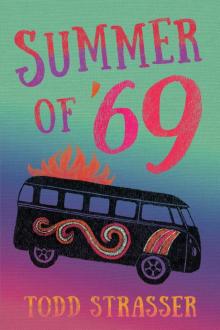 Summer of '69
Summer of '69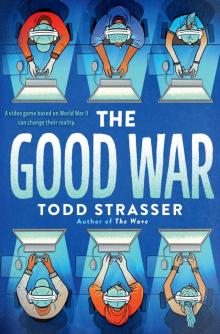 The Good War
The Good War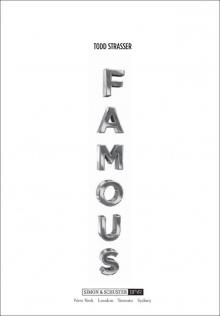 Famous
Famous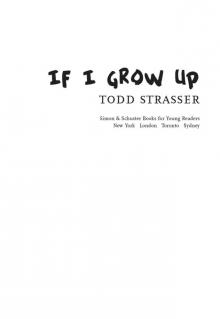 If I Grow Up
If I Grow Up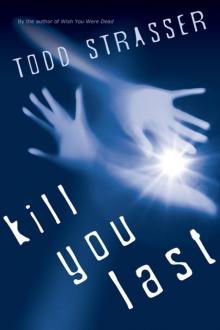 Kill You Last
Kill You Last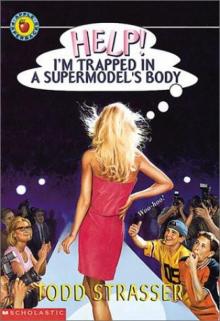 Help! I'm Trapped in a Supermodel's Body
Help! I'm Trapped in a Supermodel's Body Price of Duty
Price of Duty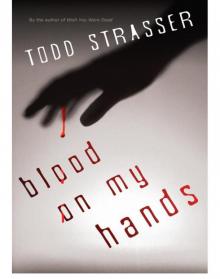 Blood on My Hands
Blood on My Hands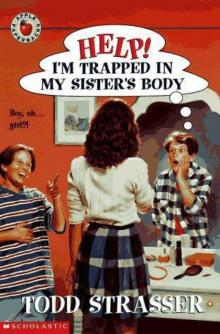 Help! I'm Trapped in My Sister's Body
Help! I'm Trapped in My Sister's Body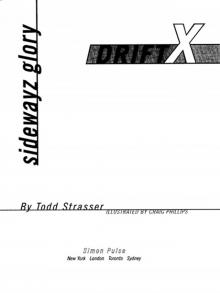 sidewayz glory
sidewayz glory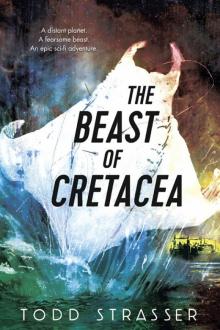 The Beast of Cretacea
The Beast of Cretacea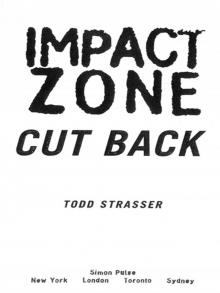 Cut Back
Cut Back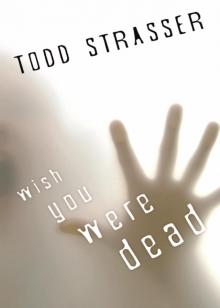 Wish You Were Dead
Wish You Were Dead The Wave
The Wave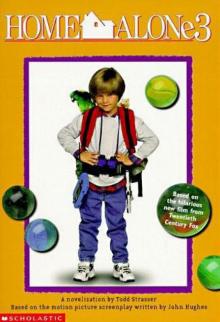 Home Alone 3
Home Alone 3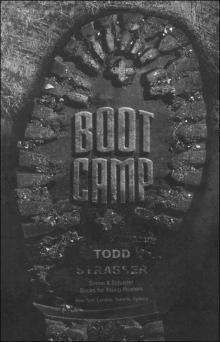 Boot Camp
Boot Camp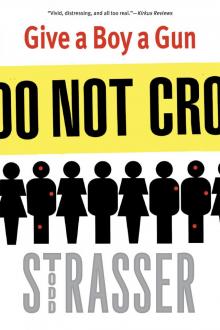 Give a Boy a Gun
Give a Boy a Gun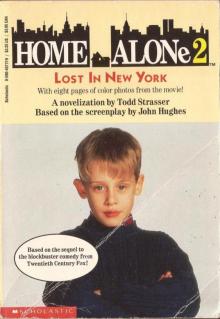 Home Alone 2
Home Alone 2 The Shore
The Shore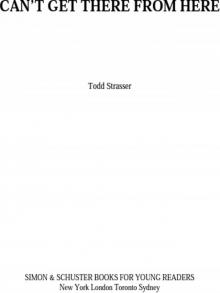 Can't Get There from Here
Can't Get There from Here Home Alone
Home Alone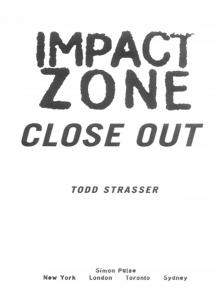 Close Out
Close Out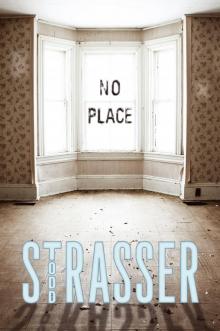 No Place
No Place Star Wars - Episode I Journal - Anakin Skywalker
Star Wars - Episode I Journal - Anakin Skywalker